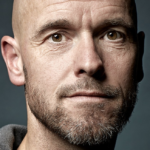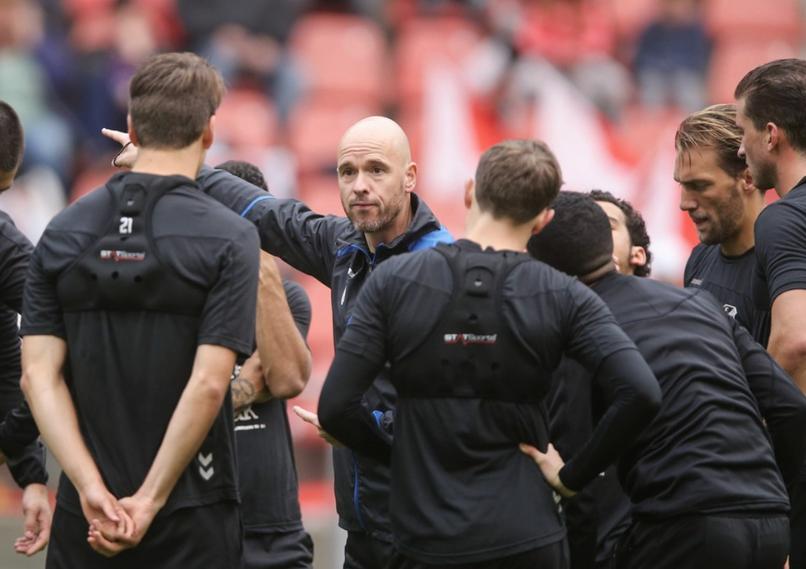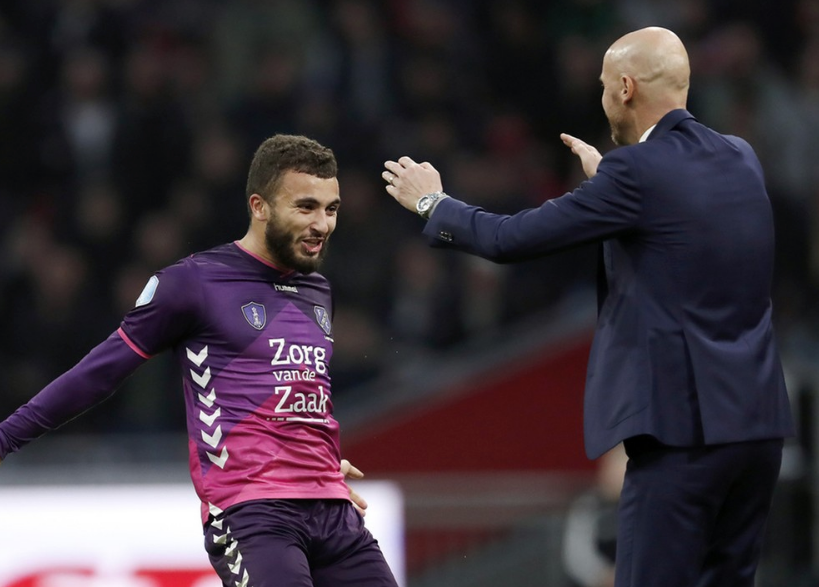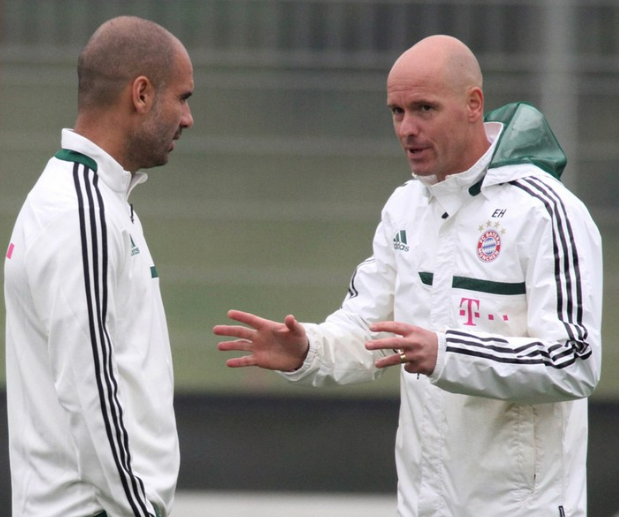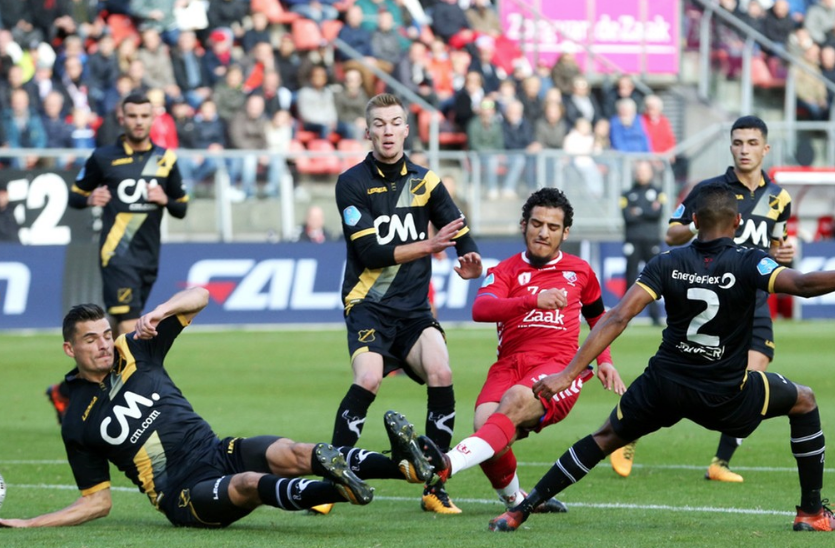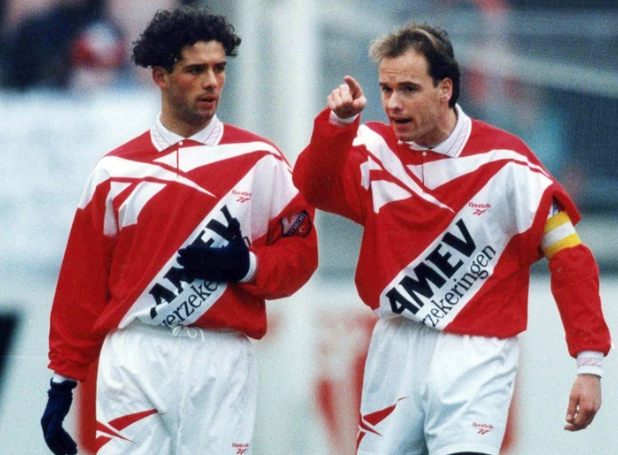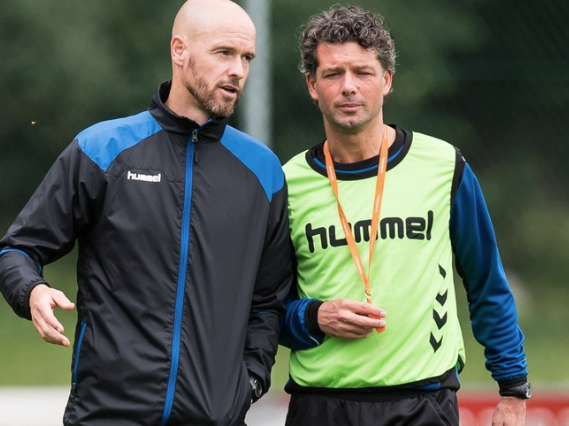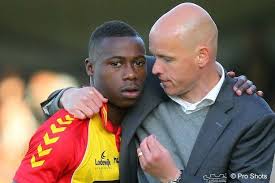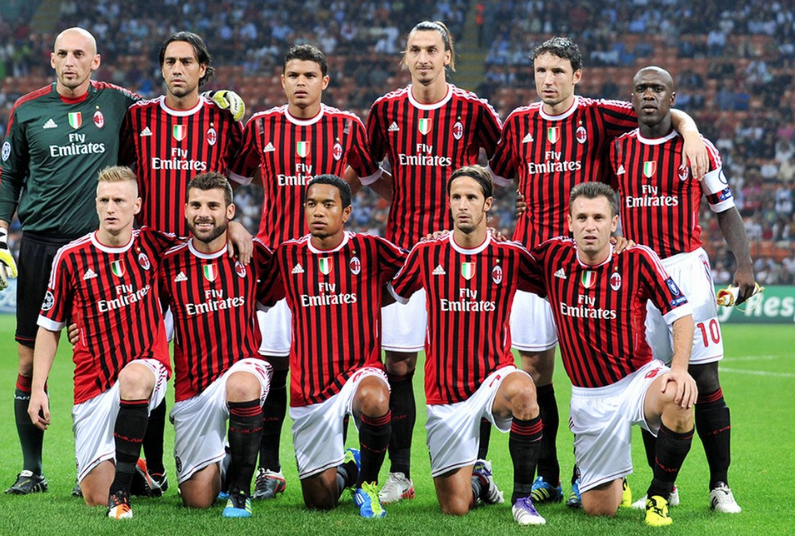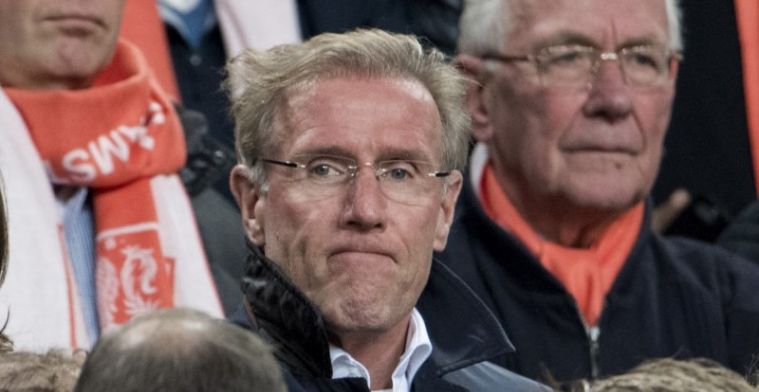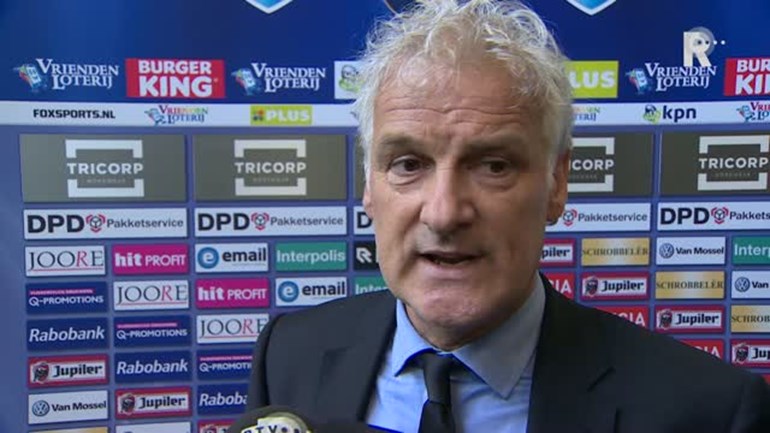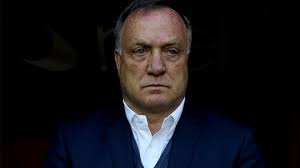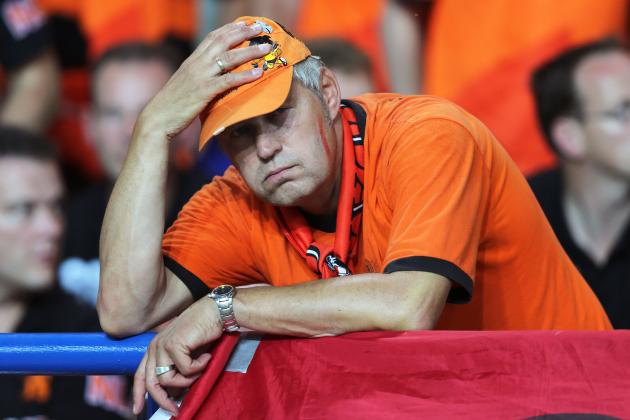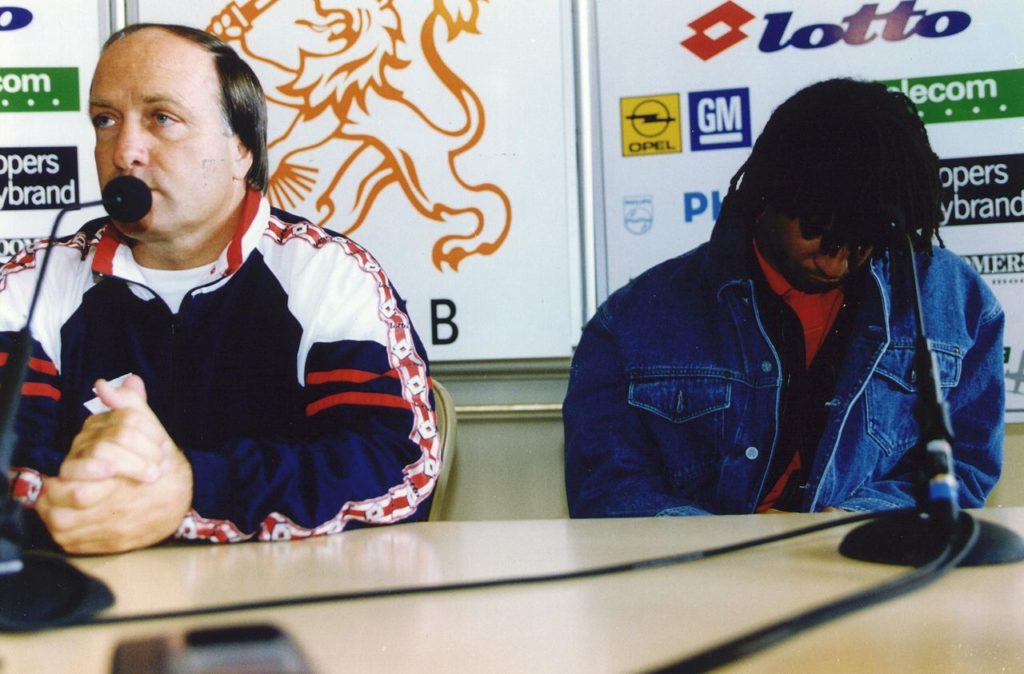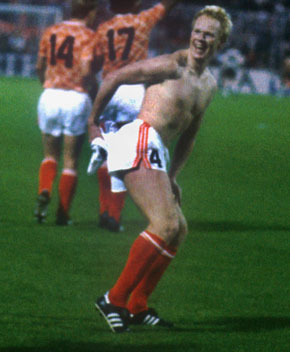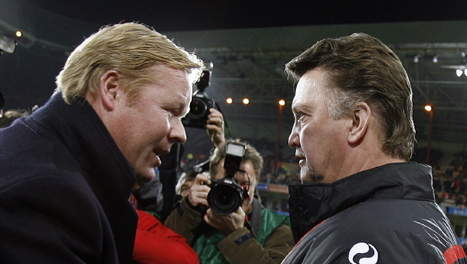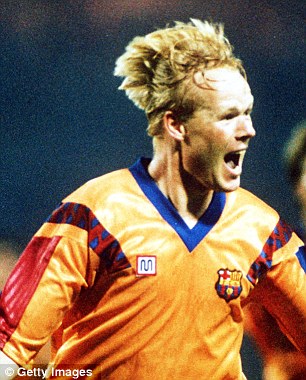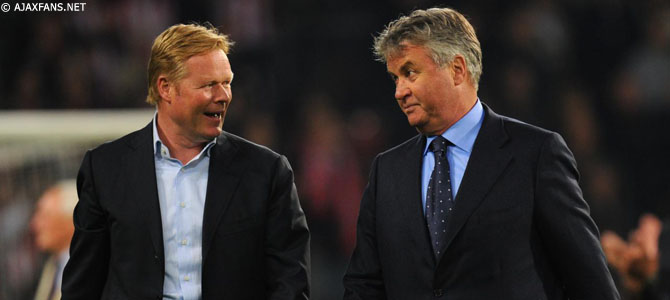We are at a turning point. Currently, in a vacuum. No team manager currently. The new technical director and the new coach are a question mark. The NT missed a second tournament in a row. And we only have two Dutch clubs in Europe, both seem to be thrown out of the competitions before the new year. A mighty low.
But it might be a good thing. We are forced to look at changing what we do. A changing of the guard as well. No more Van Gaal, Adriaanse, Van Hanegem, Advocaat, Ten Cate, Jol, but time for the next generation.
Erik ten Hag is seen as the Crown Prince among Dutch football coaches. Ten Hag started his career with FC Twente, the key club in the region where he was born. The centre back played for Twente in three periods of his career. and also donned the colours of De Graafschap, RKC Waalwijk and FC Utrecht. As a coach, he started as assistant to Fred Rutten at FC Twente, then went on to assist Rutten at PSV Eindhoven. His first head coach role was at Go Ahead Eagles where he got heads to turn. So much so that Bayern Munich signed him as the Bayern II coach, where he worked under Pep Guardiola for 2 years. He returned to Holland to coach FC Utrecht and has done so with great fanfare.
FC Utrecht, with their limited resources, had a super period with Ten Hag, reaching the cup finals and ending up fourth last season (the Best of the Rest), with sumptuous football at times.
But losing key players resulting in a renovated FC Utrecht and this season was a bit of a hit and miss for Ten Hag. Losing 1-7 at home vs PSV for instance. But also winning vs Ajax in the Johan Cruyff Arena.
Is there a crisis this season at FC Utrecht?
“This is the story of facts and perception. If you only base our opinion on perception you could interpret our results as “Utrecht is in crisis” but I stick to the facts and these tell me a different story. Already before the Ajax victory. I try to stick to the facts.”
So, what are those facts?
“Well, success comes on foot but leaves on horseback. And I’m not using the following as an excuse, but I see these as facts. For instance, despite the defeats, we now have more points than we had last season. We had a different pre-season due to the European competition and we lost four key starters: Haller (VFB Stuttgart), Barazite (Turkey), Wout Brama (Australia) and Sofyan Amrabat (Feyenoord). The year before we lost Boymans, Letschert and Bart Ramselaar. Something like that will start to have its effect. We do move on a tightrope. We did really well two years in a row, we finished 5th and 4th and reached the cup finals but we only have the 8th or 9th budget in the Eredivisie. Add to that the quality of our game, add to that the brilliant games we played against Zenit St Petersburg and before you know it people mention the word crisis when the results are a bit disappointing… Well, there’s not much wrong at FC Utrecht. But we became the victim of our own success. Now people tend to judge us as if we’re Feyenoord.”
Please go on
‘We played away vs Twente and AZ for the league and away to VVV for the cup and we were below par. There are no excuses for this. But we do play good more often than that we play bad. Especially taking into account that we needed to bring in 4 or 5 new players. And my role, is to confront the players with the facts. It’s about what’s in their mind. We shouldn’t panic or feel bad about ourselves. If we keep on doing what we do, it will come good. I think the victory vs Ajax was a big mental win for us and we laid the foundation for what will come next.”
Labayad scored the winner vs Ajax
The mind… Is there a lot to be gained in the mental aspects of the players?
‘Absolutely. See, we can play good football with Utrecht, we demonstrated this. But now, you need to deal with the dips, with the disappointments, with the fact that our solid centre forward Haller isn’t here anymore, with the fact we didn’t get into the Europa League. Now, the mentality needs to deal with the higher expectations. The men will have to step up. And I saw it vs Ajax, but I want to see it every week. And, this is not just our problem, we are talking about a key problem in Dutch football. It’s the combination of technical, tactical, physical and balanced with relations, conduct and emotion. These six aspects make the total athlete.”
How do you work with the players’ minds?
“It starts with understanding their personality. You need to know about the man behind the player. And I tell you what, I can read this from the way a player moves, the way he responds when losing the ball, when he concedes or gets fouled. I can make a picture – a broad stroke picture – of the man. And I can use this in my management. I choose a different approach per player. But thats’s only the start. You also need to look at the dynamics in the group. How they relate to one another. And I can see before the game, what kind of match we’re getting. Take AZ away, a terrible performance. I noticed in the dressing room, the tension wasn’t there. We weren’t front-foot. There was no real intensity. I could see in the way the players played the ball in the warming up, this will be a tough afternoon.”
How do you see this?
“Just, how they hit the ball. Not full. No conviction. No real idea. Just going through the motion. And I felt it back in the dressing room. And players showed tell signs of nervousness. Plucking at socks, hiding under a towel. I usually break those routines up. I don’t want it to be a nerotic thing. A “must-do” ritual. Because suddenly, if they didn’t sit under their towel, they can’t play well. It’s just creating an excuse to fail.”
So you also know when you will win?
“Not if we win, but I can see whether we will play a good match. Last season at home, also AZ. The finals of the play offs. I felt the instict, the urge to survive that match. I saw energy, intensity and we took the 3-0 defeat and turned it around, on penalties. That was the perfect example of the right mindset. I think it was the best or most impressive game I witnessed as a coach. Everyting worked: tactics, drive, mentality. And we won that match due to mental strength. AZ only had one shot on goal, in the 82nd minute! Just like the Ajax game two weeks ago, we wanted it more. I’m really proud of them in those situations.”
Pep and Ten Hag at Bayern
So, the logical question follows: why isn’t it possible to generate this more often?
‘And that is my challenge. And the challenge of the lads. Doing it better and more often all the time. PSV at home, we lost 1-7. But for an hour we are in the game. We were 1-2 behind at half time, and the lads walked into the dressing room asking themselves: how come we are behind? We should be 3-1 up! I told them: just keep going. We shouldn’t force the equaliser because PSV is lethal in the counter, but be patient. Do not open the gates. And what do we do, when PSV scores 1-3? We open the gate. We miss two major chances to get back to 3-3 and PSV beats us at a terrible moment. A throw in, we pressure forward, our back slips and Locadia is away and scores: 1-4. Then, something broke. Some players wanted to take responsibility all by themselves and do it alone, other players gave up. It all crashed down. We basically lost our minds, and PSV was able to punish us. But the next week, vs Heerenveen, we were back at it. It’s basically a matter of being on top of them constantly, demanding demanding demanding.”
So why is Bayern Munich capable of doing this week in week out, with much more talented players and Utrecht can’t do this. While the FC Utrecht players would have to work harder for it anyway?
‘Good question. I worked at Bayern and was often totally surprised by the mentality of players like Neuer, Robben and Lahm, for instance. They have accomplished so many great things, but when you see the intensity with which they train. Unreal. They constantly try and find the limits of their trade. Constantly, finding the limit and surpassing it. Again and again. Take Cristiano Ronaldo. His heading capabilities, his jump, his timing, that takes 1000s of hours of training and practice. Like with his free kicks and kicking technique. He’s so talented but he constantly demands the best out of himself. That is the difference with the subtop. But if we are subtop, we can distinguish ourselves from the level below us, by doing the same at our level.”
So how can you do this with Eredivisie players?
‘By confronting them constantly with the agreement you made with the player. I always try and find their motivation. What do you want to achieve and how will you do it? Quincy Promes, at Go Ahead Eagles. He knew exactly what he wanted and what he needed to do for it. Tremendously ambitious, that kid. And still, I had to battle with him every day.”
Is it a sign of the time?
‘Well yes. Different times, different players. I can still enjoy that video of a young Ruud van Nistelrooy, writing down his goals and achievements into a little notebook. That was all him. Nowadays, I make a POP with the players. a Personal Development Plan. These days, we facilitate these things. We facilitate everything for the youth. And we create players without the ability to find it within themselves. Whenever we played against an opponent with a different shape as expected, my players would look at the bench, confused. Coach, what do we do? Now, the players know how to deal with that. But that didn’t just happen. We had to work on that. These days, youth players get into a bus that brings them to the club. There they have study mentors, nutritional experts, etc etc.”
Yassin Ayoub, boss in midfield, sadly selected to play for Morocco
It used to be all better in the past?
‘Ha! No, it wasn’t. But it was different and we create more characters. Van Hanegem, Lerby, Jan Wouters, Mark van Bommel. They had to find that motivation themselves. But, if we don’t offer it and AZ or Vitesse or Sparta does, then these players will go there.”
And everything is becoming more invidualised?
‘I’d call it more ego-centric. But a football team needs to work together. How do you get all those egos to do that? I aim to have a good relationship with the players and I want my players to get along as a team. And I am not talking about joint holidays or playing paintball. I think teambuilding is done on the pitch. We do a lot of positioning games and I put the benchmark higher and higher. I want them to demand more and more from one another. I ask for focus, quality, the right weight on the ball, playing into the right foot, the right movement. We play 4 v 2 +1, we play 6 v 2, we play 4 v 4 + 3, I build it up from complex to even more complex. And if they’re not focused or aren’t with their head in the game, those practices fail. So you’ll see that players start to correct one another, coach one another and motivate one another. That is team building! I think you can gel a team together by the way you work, the demands you put on them and the practices you come up with. But it takes hard work. Every day you need to be sharp.”
Have you seen players change? In their personality, or attitude?
‘For sure, but you can’t blame this generation for being ego-centric. It’s a reflection of our society. In the olden days, in Twente, we had the so-called “neighbourship” Whenever a farmer had a cow that was ill, the other farmers would give him a healthy cow for the time being. And when the harvest needed to be done, they’d help each other. In the cities even, doors weren’t locked. Now, if you don’t lock your door, your furniture is for sale on Ebay. The world is different now. But I am not complaining about this generation of players. They’re not lazy. I know enough players who train individually, to work on their touch, their power, their ability to turn, the explosiveness on the first yards, etc. But they’ll need to do it within the club.”
Your training sessions are tough?
‘No not necessarily tough. I train long. I want the players to be at the club all day. But it depends on the program. Sometimes we train short but intensive. I work with my team and I’m never done. Every day, we can improve things. And where do you do that? On the pitch. You win trophies on the training pitch.”
Erik ten Hag and Jean Paul de Jong, team mates.
Fred Rutten claims we don’t train hard enough. We do less but expect more, he says. Peter Bosz thinks that is bull, and says you need to train differently.
‘It all depends per team and group. A team that plays Champions League and travels midweek needs a different approach. A team with only one match a week needs different things. A youth team needs a different approach. Players in their puberty can’t train with the same intensity as adults. You increase the risk of injuries. But when they are about 17 years old, you can practice with extreme intensity with these lads. This is the final stage of their physiological development. And you can make tremendous progress in their coordination. Their first tough, their turn, the way and timing of their sprints. I think 17 and 18 year olds need to train harder than older players. When you make the step to the first team, the level and intensity will be much higher. If you have the capacity to tag along, you can. If you haven’t invested enough, you might drop off.”
So they need to do more?
‘Yes absolutely. And you can justify it. Look at the Dutch youth teams. The Under 17s always compete with the top, but then the problems start. It’s partly the lack of competition intensity in Holland. Not enough resistance. That is not always to be helped, but the Eredivisie has been eroded in such a way, that top players leave at a young and younger age. Then there are the talent teams, the young Ajax, young Utrecht teams. We needed to have a competition for them, and from 2006 onwards we pleaded the KNVB for a good competition. But now we have that, we ruin it by not having relegation and promotion in this. The amateur clubs have vetoed this. This is not good for the quality of Dutch football. The top of the amateurs are happy to win titles, but they don’t want to be promoted because of the additional costs and infrastructure they’ll need. This needs to be resolved. This is one of the reasons why our quality has peaked and we’re getting behind countries like Belgium and Norway and Austria. In the first division, the Jupiler league, you couldn’t get relegated. So the clubs that were not able to win a trophy that season were just free-wheeling a bit. You need the opposite, you need players to want to better themselves daily. That doesn’t work when you can’t get relegated. Where is the challenge?’
Does it make sense for the talent teams of the pro clubs to play in the Jupiler league?
‘It does! Both AZ and Ajax were pretty good last season and look how the first teams now benefit from those youngsters? We had the option to get promoted into the Jupiler League with Young Utrecht and we didn’t. We couldn’t afford it. But we did it anyway and we are now reaping the rewards. Kerk, Venema are both from that team and they’ve been important for us already. They played with more resistance. I think the benefit for all is that players will ripen at a younger age.”
Erik ten Hag and JP De Jong now, coach and assistant
So, in reality, we have four talent teams in the Jupiler League and only one a division lower. The rest even lower than that.
‘Yes and that is the problem. So calculate with me: 15 players per club, which means 75 players playing with resistance every week. And all the rest is playing on a lower or even on no level… This means you can throw away a whole generation almost. Our development platform is way too narrow.”
What is the solution?
‘Well, we can’t turn back time, but ten years ago all the talent teams should have gone in that competition. But now, we do need a system of promotion and relegation, like in England. But people in Holland, in football at least, don’t like change. People think I say this for my own agenda, but what would that be? Why would I personally care? I’m talking about this because Dutch football needs it. We now have talents playing for pro clubs who don’t play weekly games at their level. That is such a waste!”
So how can you explain to outsiders that Feyenoord and Heerenveen don’t compete?
‘You can’t! There is no explanation. They probably didn’t see or didn’t care about the strategic impact for Dutch football. Their talents are getting hardly any resistance. I find it very hard to grasp and I find it disastrous.”
You were the coach of Bayern Munich II in an open competition set up
‘I saw how it worked there. Talking about resistance. We were playing away against Wurzburger Kickers. Big club in a big city with a rich sponsor. In those regional leagues, there’s big clubs. But then there’s Buchbach, a club in a rural town. A couple of former pro players with some locals, playing on a paddock of a pitch, with aggressive fans close on the pitch intimidating us. Try and win there. So you need to go full throttle, battle for every yard. As a youngster, this is how you build up character.”
This is a big challenge for the new technical director of the KNVB?
‘First the KNVB needs to tackle this. The Federation’s structure isn’t helping. You can’t change anything. I used to be head of development and I dealt with the KNVB. Everything is done via committees and boards and staff. The Netherlands is a country of compromises. The KNVB is the federation of compromises. In football, you can’t get forward with this. And now the KNVB is coming up with the weirdest brainfarts. Now there is no referee anymore at the youngest youth level. How does that work? Talents need to learn to accept authority and need to deal with decisions a ref makes. I also hear that they stopped keeping score at that age, because “kids might get demotivated if they lose big”. Add it all together: a competition set up based on the Olympic philosophy, no referees, no more scores. Who comes up with this? How can you create a top sport mentality? We are going far to far into the social aspect of it all. We want it to be social and fun and “gezellig”. This is not how you create a new Mark van Bommel or Frank de Boer! And you see it in society as well. Playing football, even at amateur level, is like life. You get educated there, you learn social behaviour, you want to achieve things, you win together, you lose together, you explore boundaries, you learn discipline. And if you are formed in the wrong way, you’re lost. We have hammered the winners mentality out of our football. It’s time to start at the top now, and change things internally at the KNVB. Change the structure and the way decisions are being made. Develop a football vision and roll this out, create acceptance with the clubs. The clubs need to support this and endorse the people who will do this job.”
Quincy Promes at Go Ahead with Ten Hag
Who would you like to see do this?
‘I think Louis van Gaal is the ideal man for the job and I think he’ll do it, but only if he gets carte blanche. Now, he knows there is not much he can do. So put him in the job, and give him free reign and change. I think Dutch football can be leading again in the future.”
What to do with that report: Winners of Tomorrow?
‘There are some good elements in there. The conclusion was: we need to do things differently, mentally and physically. And the next decision they make is to stop keeping score at youth games. I can’t understand this. I don’t see a strategy. It’s all loose sand as we say. I would love someone to explain it to me. We need a strong TD at KNVB level who can put his foot down when someone comes up with an idea like this in a meeting.”
How about you?
‘Nope, I’m still too much of a coach and trainer. And I have my hands full here at FC Utrecht. But, I do feel a joint responsibility for the state of football in The Netherlands and I feel responsible enough to be part of a discussion.”
AC Milan, with Zlatan, Nesta, Bommel, Seedorf and Urby
Former Ajax midfielder and Oranje international Urby Emanuelson is back in the Netherlands playing for FC Utrecht. His adventures took him to Italy, to England, but he’s happy in Holland, despite less money on the pay-check. He’s quite positive about Erik ten Hag.
“Ten Hag thinks more international than many a Dutch coach. It’s so clear that he worked in Germany, with Bayern and with Pep Guardiola. In Holland, adapting the 4-3-3 system is almost blasphemy, but Ten Hag uses different systems as a weapon. He is doing what Pep is doing. He changes things, he challenges beliefs and wants players to be flexible. And Barcelona and Man City and Bayern, they all do it. They play 3 or 4 different systems, sometimes in one match.”
Is Ten Hag one of the best coaches you worked with?
“For sure. He is, he is always involved and genuinely interested in you. And he’s working individually with players, very intense. And he’s a super human being as well. That to me is very important too. But I was lucky in my career. Henk ten Cate was super, Maxi Allegri at AC Milan was a genius. But the best coach I ever worked with: Marco van Basten, no doubt. I had my best time with him. His ideas about football, his vision, the way he had the team play in 2008. But, there is no one as critical of himself as Marco and when he quit just like that, I thought: yep, typical Van Basten…”
Would Ten Hag be a good national team manager?
“100%. He has the guts to do things differently. We seem to have made 4-3-3 holy for some reason, but it’s about the results and Erik is capable of finding a playing style that fits the players and will get results. I am convinced he can do what he does with Utrecht at a higher level.”

